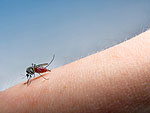 Make sure you wear long pants and shirts when outside between sunset and sunrise. At least that’s the recommendation of the Centers for Disease Control and Prevention (CDC).
Make sure you wear long pants and shirts when outside between sunset and sunrise. At least that’s the recommendation of the Centers for Disease Control and Prevention (CDC).
It seems that the number of West Nile cases is on the rise. The CDC reported that, in 2009, there were 720 confirmed cases of West Nile and 32 fatalities. In 2010, numbers were up, with 1,021 confirmed cases and 57 deaths.
Peak mosquito season is in August and September and the number of West Nile cases is expected to rise even more in 2011.
If you are infected with West Nile, you can experience symptoms such as fever, headache, body aches, nausea, and vomiting. These symptoms can last a few days or several weeks.
So who is most at risk for contracting West Nile? A recent study performed in Suffolk County, New York, explored the association between the risk of West Nile and habitat, landscape, virus activity, and socioeconomic variables. After reviewing data from the time period between 2000 and 2004, researchers found that middle-class suburban neighborhoods are the areas with the highest West Nile human risk.
These results contrast with similar studies from the southern and western U.S., where the highest West Nile risk was associated with low income areas.
Fortunately, only about one percent of people infected with the virus develop a severe illness. High fever, headache, neck stiffness, stupor, disorientation, coma, tremors, convulsions, muscle weakness, vision loss, numbness, and paralysis are some of the symptoms of a severe case of West Nile. Again, these symptoms may last several weeks.
In rare cases, the West Nile virus can enter the brain. It can then cause deadly diseases such as encephalitis or meningitis.
There are a few precautions you can take, especially if you live in a suburban neighborhood, to avoid contracting the virus. The best health advice is to wear long pants and sleeves, especially around dusk, as mentioned. Use insect repellant (try citronella spray, which is a natural repellant). Get rid of any standing water around your house. Mosquitoes love to breed in still water. And keep screens on doors and windows in good repair. You can also get your doctors advice about preventing West Nile infections.
Following these simple guidelines should help you enjoy the rest of the summer, free of worries about West Nile.
